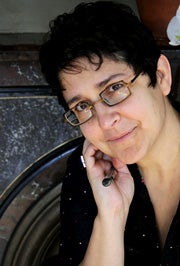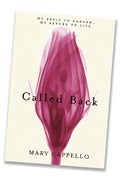Hot off the Presses
Called Back: My Reply to Cancer

Cancer and hope often sit side by side in a hospital waiting room. Interestingly, two professors recently published books that explore each topic.
“The moment the suspicious looks start flying among the technicians in mammography you can pretty well tell that your life is going to change,” recalls English Professor Mary Cappello about entering the often harrowing world of medicine.
Rather than blink, Cappello looks at her breast cancer straight on with a poet’s eye for incongruity. She translates those experiences into her newest book, Called Back: My Reply to Cancer, My Return to Life, just published by Alyson books. The book is part memoir, part meditative, and wholly absorbing.
The book follows Cappello’s diagnosis, surgery, chemotherapy, and radiation, but it does more than simply reproduce the standard neatly packaged redemption narrative.  “I hope my approach opens things up rather than closes off aspects of the treatment and disease that we’d rather not discuss, admit, or meditate on,” she says. “To put this another way: What happens inside of the treatment regime is entirely expected, but what happens inside of the book is not—and this establishes both an intellectual and emotional suspense in the book.”
“I hope my approach opens things up rather than closes off aspects of the treatment and disease that we’d rather not discuss, admit, or meditate on,” she says. “To put this another way: What happens inside of the treatment regime is entirely expected, but what happens inside of the book is not—and this establishes both an intellectual and emotional suspense in the book.”
Hope in the Age of Anxiety
In these times of economic uncertainty, shrinking life savings, fear of global terrorism, and medicine-resistant germs, comes Hope in the Age of Anxiety, just released by Oxford University Press.

Co-authored by two clinical psychologists, URI Professor Henry Biller and Anthony Scioli, M.A. ’87, Ph.D. ’90, of Keene State College, the book does not talk about blind optimism, wishful thinking, or denial of reality but spans the “roots and wings” of true hope. Their message is simple: Hope matters!
Emily Dickinson suggests that hope is the “thing with feathers that perches in the soul”; President Barack Obama, author of The Audacity of Hope called it “the bedrock of the nation; the belief that our destiny will not be written for us, but by us.”
Scioli, Biller’s former student who is also a member of the URI graduate faculty, says “abiding in hope is the basis for achieving true success, crafting loving relationships, and securing a genuine sense of peace.”
The authors find current theories on hope narrow at best. The pair drew on their own clinical experiences as well as the best insights of philosophers, theologians, poets, and scientists from a variety of fields, to develop a fresh perspective on the topic.
Grounded in science with practical tips, Hope in the Age of Anxiety focuses on four universal aspects of human experience that embody the essence of hope: attachment, mastery, survival, and spirituality and offers hope lessons and hope tips.
To help hope seekers discover their current hope profile, Biller and Scioli created a hope “test”, a 40-question instrument at the book’s web site, gainhope.com.
 Home
Home Browse
Browse Close
Close Events
Events Maps
Maps Email
Email Brightspace
Brightspace eCampus
eCampus


